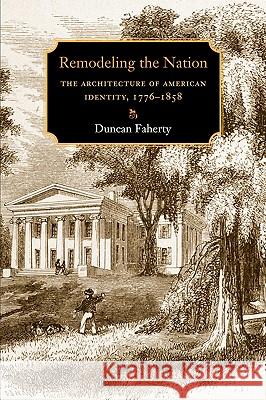Remodeling the Nation: The Architecture of American Identity, 1776-1858 » książka
Remodeling the Nation: The Architecture of American Identity, 1776-1858
ISBN-13: 9781584657729 / Angielski / Miękka / 2009 / 268 str.
In this interdisciplinary study, Faherty argues that throughout the late eighteenth and early nineteenth centuries, Americans conceptualized their still unsettled political and social states through metaphors of home building. During this period, a pervasive concern with the design and furnishing of houses helped writers to manage previous encounters with settlements, both native and European, and to imagine and remodel a new national ideal. By aligning the period's architectural concerns (registered in both the interior and exterior of houses) with concurrent debates about the need to create a national identity in the wake of the American Revolution, Faherty registers how representations of the house were a crucial locus for debating broadly shared concerns about the anxieties of nation building.
Topics include Abraham Lincoln's use of architectural motifs in his 1858 senatorial campaign (the "house divided against itself " speech); the arguments about domestic identity embodied in the designs of Mount Vernon and Monticello; the lingering import of colonial and indigenous settlements on post-revolutionary culture as registered in the work of William Bartram and Lewis and Clark; Charles Brockden Brown's representations of the multivalent legacies of Pennsylvania's architectural landscapes; Washington Irving's attempts to preserve and remodel national architectural and literary practices by underscoring the manufactured nature of European cultural production; the shifting importance of the house and American attitudes toward nature in the work of three generations of the Cooper family; and the gendering of domestic space in the work of Edgar Allen Poe, Nathaniel Hawthorne, and Herman Melville. Richly informed by contemporary work in literary studies, history, art history, and cultural criticism, Remodeling the Nation ranges incisively across the work of political theorists, social critics, novelists, poets, natural historians, landscape artists, travel writers, and authors of architectural and domestic treatises.










